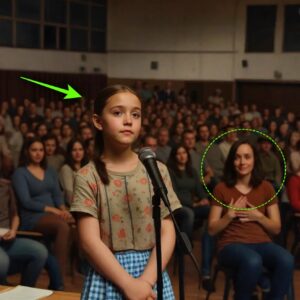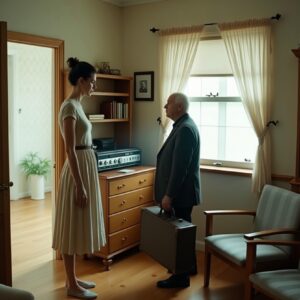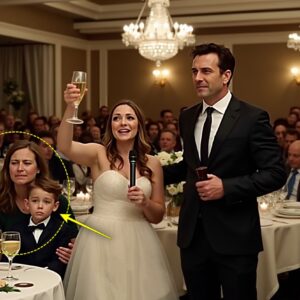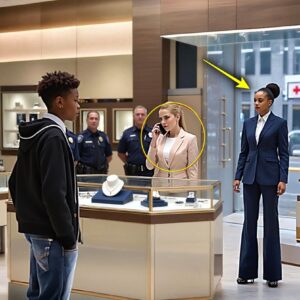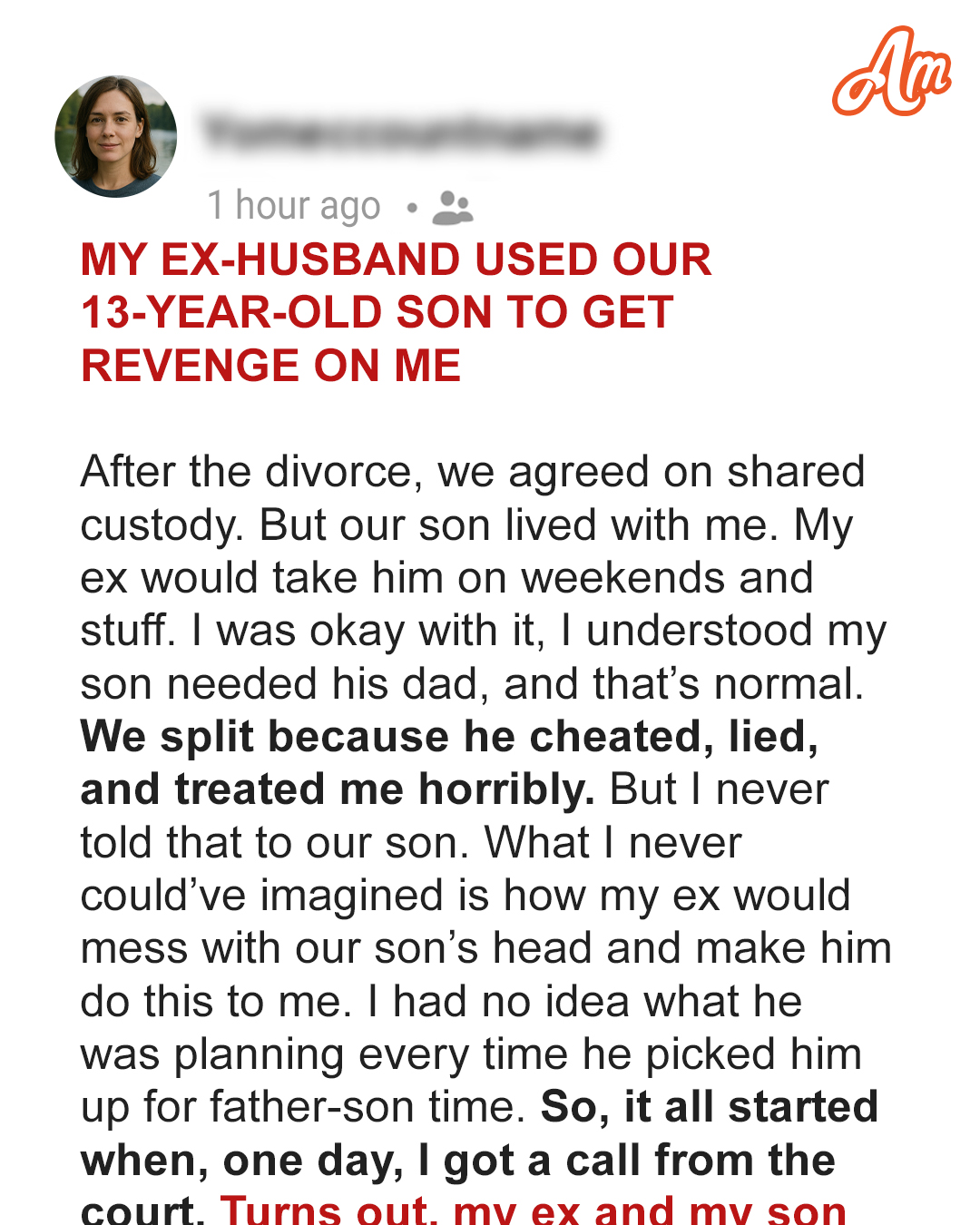
When Lily’s ex-husband used their 13-year-old son to build a case against her, she’s blindsided by betrayal that cuts deeper than any courtroom battle. But as the truth unfolds and her son begins to understand the cost of manipulation, Lily finds the strength to protect more than custody… she protects their bond.
It wasn’t the courtroom that broke me. It was realizing the footage they used against me came from Liam, my 13-year-old son.
After Jimmy and I split, we agreed on shared custody. Liam stayed mostly with me. Weekends, holidays, he’d go to his dad’s. I tried to be fair. Tried to be the “bigger person.”
I never poisoned Liam’s mind, never told him about the cheating, the gaslighting, the time Jimmy screamed at me for breathing too loud.
I just wanted Liam to have a father.
What I didn’t expect was for that same father to turn Liam into a weapon.
Liam’s always been a soft soul. He’s sensitive in a way that made me ache for the world he’d have to grow up in. He cried once when we found a pigeon with a broken wing on the sidewalk. He refused to leave until animal rescue came.
When I had a bad day and tried to hide it, he taped a red crayon “I love you, Mom” note to my bathroom mirror.
He’s always leaned a little closer to me. I was the one who bandaged his scraped knees. The one who sat through every school concert and made French toast on test mornings. Fevered nights, science fairs, forgotten lunches… I never missed a beat.
As for Jimmy?
Jimmy never got over that closeness. He never got over us. He said that he forgave me after the divorce. But his voice, low, flat, too polite, told another story. Especially whenever he came to pick Liam up.
It started small. Liam leaving his phone in odd spots. On top of the fridge, angled just so. Propped on a bookshelf. Balanced on the piano. I chalked it up to distraction.
Teenagers and their tech. Who knew why they did any of the things they did? I thought that maybe he was recording himself for a YouTube challenge or filming some goofy trend.
But then, one night, I turned on the hallway light and saw a thin red glow on the living room wall. A tiny dot, barely noticeable. A recording light.
“Liam?” I asked, gentle but alert. “Why is your phone recording?”
His expression flickered. Eyes wide, then narrowing like he was reaching for something rehearsed.
“It’s for school, Mom,” he said calmly. “We’re doing a project. A day in the life… family stuff, you know?”
I hesitated. Why hadn’t he told me earlier? I would have brushed my hair at least. And maybe changed out of my comfy t-shirt and leggings. But why was the phone always aimed at me?
But I wanted to believe him. Because he was my son.
And I never imagined that he’d be used against me.
Two weeks later, I got served.
A thick envelope. Unfamiliar handwriting. Liam had just gone to bed. I opened it at the kitchen table with trembling hands.
Jimmy was filing for full custody.
“What the actual hell is going on?” I muttered under my breath.
My breath hitched and a low ache formed in my stomach. The paperwork was heavy in my lap. There were pages and pages of claims, declarations, legal jargon.
But it wasn’t the size that crushed me.
It was the evidence.
In court, I sat straight-backed on the stiff wooden bench, palms damp against my things. Jimmy sat across the aisle like he was settling into a movie theater. Arms folded. And he had a stupid, smug grin that played at the corner of his mouth.
Then the footage began.
There was my living room. My voice, but colder. My face, but hollow. It was me pacing, scolding Liam, tears on my cheeks.
“I can’t do this anymore,” my voice whispered from the screen.
But it didn’t match. My mouth moved out of sync. The pitch of my voice shifted mid-sentence. Whole moments had been erased. Context was missing. Gone.
The warmth, the laughter, the soft beginnings of sentences… all vanished.
The video didn’t just twist me. It seemed to hollow me out.
My home had become a weapon. My motherhood was now an edited montage of fatigue and frustration, looped on a courtroom screen like an exhibit.
And Liam?
My son sat beside Jimmy, staring at his shoes like they might tell him what to feel.
I felt the burn rising in my chest. My throat was raw with unshed grief.
But I didn’t cry. I couldn’t. Not there. Not for Jimmy to see.
“Lily, do you have a response?” the judge finally asked me.
“I do,” I said, standing up.
And for the first time in weeks, my voice didn’t shake.
I’d hired a digital forensic analyst named Devon. He was calm and brilliant, not to mention furious on my behalf.
“Lily! This isn’t just edited footage,” he told me, scrolling through waveforms. “It’s manipulated. Audio overdubbed. Scenes reordered. He clipped out the good stuff. Your laughter? The hugs… the quiet moments.”
So… I hadn’t been losing my mind?
When I hired Devon, I had given him access to Liam’s cloud. He had access to everything Liam had ever taken photos and recordings of. We had the same Apple ID from when he was younger. I’d never turned off family sharing.
I figured that my child wouldn’t have hurt me. Not willingly. There was so much more to the story. And I needed Devon to help me prove to the court.
I needed the judge to know that I was a mother who would lay herself down on train tracks for her son. This digitally manipulated version of me did not extend beyond someone’s computer.
“This wasn’t sloppily done,” Devon said, pausing. “Someone wanted this to really hurt you.”
Devon wrote a full report. Recovered original data. Restored cut segments.
At the next hearing, my lawyer handed the judge a flash drive.
“We’d like to submit a counter,” she said.
And the truth played back.
Me laughing with Liam. Teasing him about his messy hair. Pulling him in for a hug. Even the “angry” scenes, now seen whole, showed me asking him for help, not unleashing rage.
Parenting, not punishment.
Jimmy shifted, his jaw tight. Eyes flicking between the judge and his lawyer.
“This appears to be manipulated evidence,” the judge said. “Significantly.”
I won. But that wasn’t the real victory.
The next morning, I found Liam curled up on the couch, knees hugged to his chest, face half-buried in the blanket. The house was quiet, that strange kind of still that settles after something traumatic.
His phone was nowhere in sight. He held onto our dog, Max, like his life depended on it.
I sat on the armrest, watching him breathe. He looked so small, so unlike the boy who used to beg to stay up past bedtime or chase the dog through the yard with a makeshift cape.
“Mom?” he said without looking at me. His voice cracked on the single syllable.
I didn’t speak. I just waited.
“I didn’t know,” he whispered. “I thought… I thought I was helping Dad show how tired you were. He said you needed support. That if the court saw how much you did on your own, they’d step in and give you a break.”
He looked up then, eyes rimmed in red.
“I didn’t know he’d cut it up like that. I swear,” his bottom lip trembled. “He told me to leave the phone places. To keep it running. He said that I was helping you… That he couldn’t talk to you anymore, but I could still help.”
“And you didn’t think that was strange?” I asked softly, not unkindly, just… broken.
“I did,” he said after a long pause. “But he was so nice about it. He kept saying you were sad all the time. That it wasn’t your fault but someone needed to step in. I thought…” he blinked fast. “I thought if he showed the court how hard things were, they’d help. That you’d get help. You get me?”
That last part broke him. He folded into me like a house caving in on itself.
“Do you still love me?”
“Oh, my boy,” I exclaimed, pulling him closer.
My arms wrapped around Liam’s shoulders, my cheek resting against his hair.
“Of course, I still love you,” I whispered. “I know you didn’t mean to hurt me.”
We sat there for a long time. Two people stitched back together by silence. That night, I deleted every smart device in the house. The speakers, the hubs, the cameras. We sat there until he smiled.
Gone…
Not because I thought Liam would record me again. But because I needed our home to feel like ours again.
The court granted me full physical custody. Jimmy was limited to supervised visitation, his access to Liam’s schooling, medical decisions and records legally severed.
Everything goes through a mediator now. A buffer. A wall.
But no legal ruling fixes trust overnight.
For weeks, Liam hovered in doorways. Watched my face like it held the weather report for his safety. He apologized for things that didn’t need apologies. Closed doors extra softly. Laughed too quickly.
Like he was trying to prove something, trying to be less.
One night, we were washing dishes together, shoulder to shoulder under the warm light of the kitchen. The air smelled like lemon soap and garlic from dinner.
He dropped a plate. It shattered on the tile.
Liam gasped, his whole body tensing.
“I’m sorry! Mom, I’m sorry! I’ll clean it! I swear—”
He backed away like I might raise a hand. Like I’d snap at him.
I turned off the tap. I took a deep breath and reached for his hands.
“Liam,” I said, voice soft but sure. “You’re not in trouble, baby. It’s just a plate. We’re okay.”
His eyes searched mine like he didn’t quite believe me.
Then, slowly, he nodded. Together, we picked up the pieces.
Jimmy didn’t vanish. Men like him don’t. They linger like smoke after the fire.
He still sends messages through lawyers. Thinly veiled jabs buried in legalese. He’s confused, apparently, about why Liam won’t call him “Dad” without flinching.
About why the boy he used to coach in baseball now speaks to him like he’s a stranger at the door.
“She’s alienating Liam,” Jimmy claimed once.
No, Jimmy. You did that all by yourself.
Liam sees clearly now. He understands the difference between presence and pressure. Between being supported and being used. He knows that sometimes, love isn’t love.
It’s leverage.
And me?
I learned that privacy isn’t just locked doors or deleted footage. It’s emotional sovereignty. It’s teaching your child that trust is earned, not owed. That safety isn’t just about being protected, it’s about being believed.
Now, when Liam leaves for his short, scheduled visits with his father, I don’t say, “Be good.”
“Be honest. Feel what you feel,” I say instead.
And when he comes home?
We make hot cocoa. We play Uno. Liam kicks off his shoes and knows, without asking, that this is his place. No cameras. No games. Just us.
And do you know what’s the last thing Jimmy ever said to me, face-to-face?
“You’re making me look like the bad guy here, Lily.”
“You did that all by yourself, Jimmy,” I replied.
Liam and I are still healing together. Last week, he came into the kitchen while I was flipping through a cookbook I hadn’t touched since the divorce.
He lingered in the doorway for a second, then padded over and leaned against the counter.
“Do we still have the brownie mix?” he asked, voice low.
“You want some brownies?” I asked.
“We used to make them… when I had nightmares,” he shrugged.
“We don’t need an excuse for brownies,” I smiled.
We moved around each other in the kitchen with the kind of rhythm only shared history can create. Liam cracked the eggs. I melted the butter. He stole a spoonful of batter when he thought I wasn’t looking.
When the brownies were in the oven, he sat on the floor and hugged his knees.
“I still feel weird sometimes, Mom,” he said. “Like… like I should have known better. Like I messed everything up.”
I knelt beside him, brushing a crumb from his cheek.
“Baby, you trusted someone who was supposed to protect you. That’s not your fault.”
“But it was you! And I hurt you!”
“And you also came back to me the moment you realized what was happening,” I said. “You told the truth. That matters more than anything else.”
The timer beeped. He wiped his face quickly, stood up and grinned through glassy eyes.
“Bet they’re going to be gooey,” he said.
“Just how we like them!”
We sat at the table with warm brownies and glasses of milk, chocolate smudges on our fingers and a kind of quiet that felt warm instead of hollow.
And in that moment, without cameras or courtrooms or anyone watching, we were just a mom and her son, healing one bite at a time.
If you’ve enjoyed this story, here’s another one for you |
Dahlia pours her heart into planning her brother’s wedding, from designing the invitation to booking vendors to even baking the perfect cake. But on the big day, she discovers a brutal betrayal: she’s not invited. As secrets unravel and loyalties are tested, Dahlia must decide if some betrayals deserve forgiveness… or just a slice of revenge.
This work is inspired by real events and people, but it has been fictionalized for creative purposes. Names, characters, and details have been changed to protect privacy and enhance the narrative. Any resemblance to actual persons, living or dead, or actual events is purely coincidental and not intended by the author.
The author and publisher make no claims to the accuracy of events or the portrayal of characters and are not liable for any misinterpretation. This story is provided “as is,” and any opinions expressed are those of the characters and do not reflect the views of the author or publisher.
